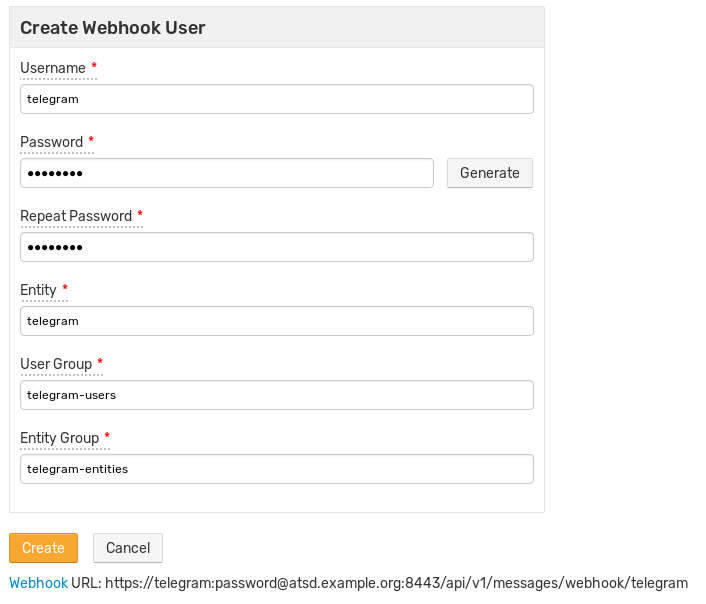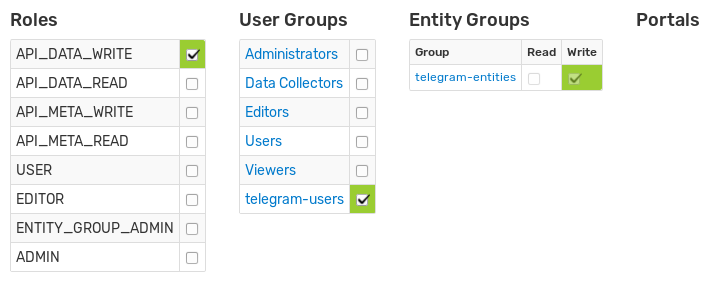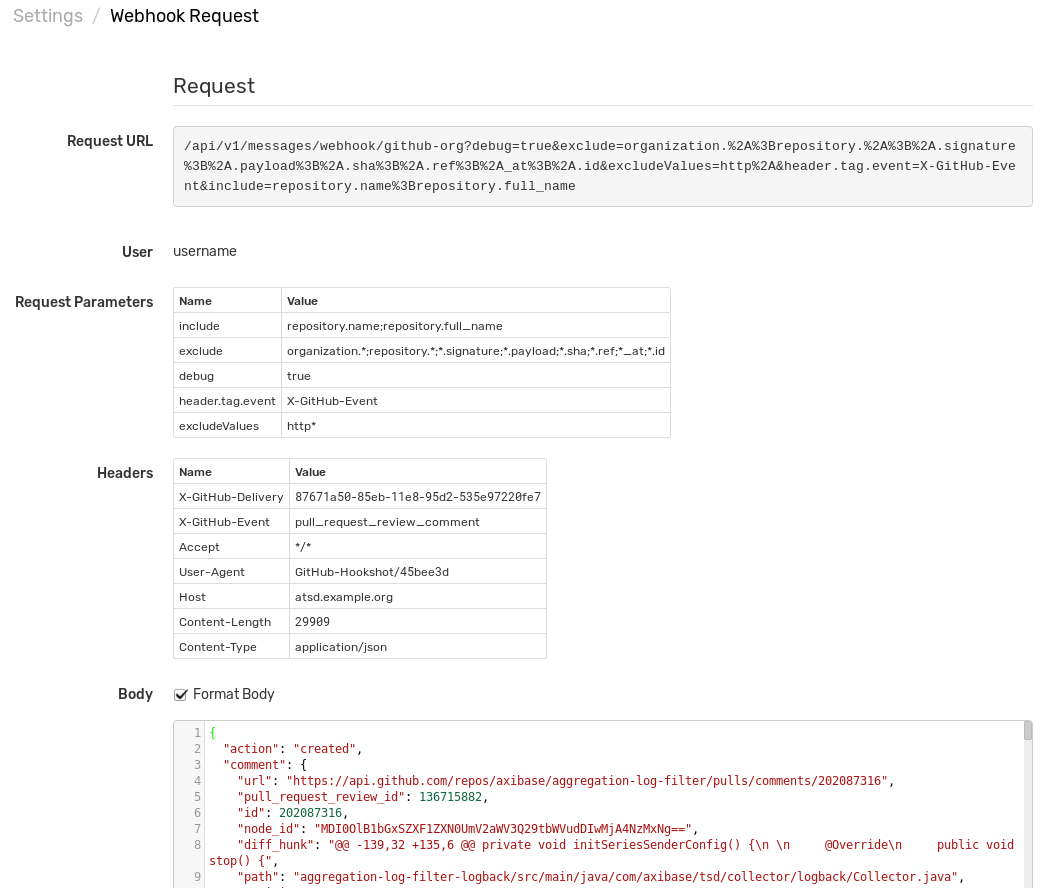Incoming Webhooks
Description
This method accepts GET and POST requests with optional JSON or form payload and converts the request into message fields. The produced message is stored in the database and processed in the rule engine.
A set of reserved parameter names, specified in the query string, instruct the server how to parse incoming requests. The reserved parameters determine mappings between the request content and message fields as well as define which data is discarded as extraneous.
This method can be used to process HTTP notifications from services that support webhooks such as GitHub, AWS SNS, Jenkins, Docker Hub, Slack/Telegram/Discord Bots etc.
Reference
- Request
- Authentication
- Authorization
- Request Parameters
- JSON Payload
- Entity Mapping
- Default Message Field Values
- Reserved Request Parameters
- Parameter Precedence
- Sample URLs
- Example
- Diagnostics
Request
| Method | Path | Payload | Content-Type Header |
|---|---|---|---|
POST | /api/v1/messages/webhook/* | JSON | application/json |
POST | /api/v1/messages/webhook/* | key=value | application/x-www-form-urlencoded |
GET | /api/v1/messages/webhook/* | None | - |
The URL path after the /webhook part can be customized, for example /api/v1/messages/webhook/service-1.
Authentication
Requests must be authenticated.
When initiating a request with an HTTP client, user credentials must be included in the request URL or specified in the Authentication header.
https://username:password@atsd_hostname:8443/api/v1/messages/webhook/jenkins?entity=jen01
Authorization
The user must have API_DATA_WRITE role and write permissions for the target entity.
Webhook User Wizard
To create a new user with permissions to write data for a specific entity, open Settings > Users and select Create Webhook User from the split-button located below the Users table.

The wizard automatically creates user and entity groups and grant necessary permissions.

Request Parameters
Request parameters, except for reserved parameters, are converted into message tags where tag names equal parameter names and tag values equal parameter values. Tag names are converted to lower case. Non-printable characters such as tab or space in tag names are replaced with an underscore.
Request URL:
/api/v1/messages/webhook/incoming?entity=test-1&action=started&Repeat=1
Message tags:
action=started
repeat=1
JSON Payload
The JSON payload is parsed to locate numeric, string, and boolean fields which are added to the message as tags. The tag name is set from the field path, which is composed from the parent object path, followed by dot . and the field's own name. Tag names are converted to lower case with non-printable characters such as tab or space replaced with an underscore.
Input document:
{
"event": "commit",
"repository": {
"name": "atsd",
"public": true,
"Full Name": "Axibase TSD",
"references": [],
"authors": ["john.doe", "mary.jones"]
}
}
Message tags:
event = commit
repository.name = atsd
repository.public = true
repository.full_name = Axibase TSD
repository.authors[0] = john.doe
repository.authors[1] = mary.jones
String fields are unquoted by removing leading and trailing single or double quotes, if present.
Array elements are assigned names based on array name and element index, starting with 0 for the first element.
Entity Mapping
Since stored message are always associated with an entity, the request must include rules for the server to determine the entity name from the request parameters or the payload.
By default, the entity is set to the remainder of the path following the
/api/v1/messages/webhook/prefix./api/v1/messages/webhook/jenkins?hello=worldentity = jenkinsThe entity can be specified literally by adding an
entityparameter to the query string, for example/api/v1/messages/webhook/jenkins?entity=test-1entity = test-1The entity can be extracted from a JSON field by referencing the field full name with
command.entityparameter, for example/api/v1/messages/webhook/jenkins?command.entity=server.name{ "server": { "name": "test-2", "site": "NUR" } }entity = test-2The entity can be extracted from request headers by specifying the header name, for example
/api/v1/messages/webhook/jenkins?header.entity=X-AXI-RegionHTTP request headers:
X-AXI-Region: us-east-01entity = us-east-01
Default Message Field Values
- Message
typeiswebhook. - Message
sourceis set to the remainder of the URL path after the/webhook/part (and before the query string). If the remainder is empty, thesourceis set to empty string.
source = incoming for /api/v1/messages/webhook/incoming?entity=test
source = for /api/v1/messages/webhook?entity=test
- Message
entityis set to the remainder of the URL path after/webhook/(but before the query string). If the remainder is empty, theentitymust be specified as described in the Entity Mapping section above. - Message
severityis undefined. - Message
dateis set to current server time. - Message tag
request_ipis set to the remote IP address of the HTTP client that initiated the request.
Reserved Request Parameters
Literal Value Parameters
These parameters set message fields to literal values.
| Name | Description |
|---|---|
type | Message type. |
source | Message source. |
entity | Message entity. |
date | Message date and time in ISO format. |
message | Message text. |
severity | Message severity as an integer or text code. |
datetimePattern | Date pattern applied to command.date field: iso (default), seconds, milliseconds, user-defined date pattern. |
/api/v1/messages/webhook/jenkins?entity=test-1&type=ci&severity=3
entity = test-1
type = ci
severity = WARNING
Command Parameters
Command parameters set message field values from JSON field values.
| Name | Description |
|---|---|
command.type | Message type. |
command.source | Message source. |
command.entity | Message entity. |
command.date | Message time in ISO format, Unix time in milliseconds or seconds, or user-defined format specified with datetimePattern parameter. |
command.message | Message text. |
command.severity | Message severity specified as an integer or as a constant. |
/api/v1/messages/webhook/jenkins?command.entity=server&command.type=event
{
"server": "test-2",
"event": "deploy"
}
entity = test-2
type = deploy
Header Parameters
Header parameters set message field values from header values.
| Name | Description |
|---|---|
header.type | Message type. |
header.source | Message source. |
header.entity | Message entity. |
header.date | Message date and time in ISO format. |
header.message | Message text. |
header.tag.{name} | Message tag. |
header.severity | Message severity specified as an integer or as a constant. |
/api/v1/messages/webhook/github?header.tag.event=X-GitHub-Event
User-Agent: GitHub-Hookshot/5ee1da1
X-GitHub-Delivery: 955bf180-e573-11e7-9438-56fe67d6b38d
X-GitHub-Event: watch
X-Hub-Signature: sha1=b0d4aa86d17c6b77e5b35e7482769955ad9aca4d
entity = github
tags.event = watch
Filter Parameters
The filter parameters contain patterns that the converted message tags must satisfy to be included in the generated message command.
| Name | Description |
|---|---|
exclude | Exclude tags with names that match the specified pattern. |
excludeValues | Exclude tags with values that match the specified pattern. |
include | Override exclude rules by including tags with names that match the specified pattern. |
includeValues | Override excludeValues rules by including tags with values that match the specified pattern. |
- The patterns support
*as a wildcard. - Tag name match is case-INsensitive.
- The parameters can contain multiple patterns separated by semi-colon
;.
&exclude=repository.*;sender.location
- Parameters can be repeated in the query string.
&exclude=repository.*&exclude=sender.location
Example:
&exclude=repository.*&include=repository.name
{
"event": "commit",
"result": "ok",
"repository": {
"name": "atsd",
"public": true,
"Full Name": "Axibase TSD",
"references": []
}
}
Message fields:
tag.event = commit
tag.result = ok
tag.repository.name = atsd
Parse Parameters
| Name | Description |
|---|---|
json.parse | Name of the request parameter or a field in the JSON payload to be parsed as a JSON document and converted into message tags similar to the JSON payload itself. |
Examples:
- Form content type
/api/v1/messages/webhook/travis-ci?json.parse=payload
In this example the payload parameter contains a JSON string which is parsed into message tags using the json.parse=payload instruction.
event=build&payload={"id":371662529,"number":"217","config":{"os":"linux"}}
Message tags:
event=build
payload.id=371662529
payload.number=217
payload.config.os=linux
- JSON content type
/api/v1/messages/webhook/aws-cloudwatch?json.parse=Message
The Message field in the JSON payload contains a string which is a JSON document itself. The Message field value is parsed and converted into message tags using the json.parse=Message instruction.
{
"Type": "Notification",
"Message": "{\"version\":\"0\",\"source\":\"aws.ec2\",\"region\":\"us-east-1\"}"
}
Message tags:
type=Notification
message.version=0
message.source=aws.ec2
message.region=us-east-1
Control Parameters
| Name | Description |
|---|---|
debug | If set to true, the response includes the message record in JSON format. |
Parameter Precedence
The reserved parameters have the following precedence:
- Literal Value Parameters
- Command Parameters
- Header Parameters
Example:
- Request URL:
/api/v1/messages/webhook/github?entity=test-1&header.entity=User-Agent&command.entity=server
- Request Headers:
User-Agent: GitHub-Hookshot/5ee1da1
- Request Payload:
{
"server": "test-2"
}
- Message Command:
type=github
source=webhook
entity=test-1
tags:
server=test-2
equest_ip=...
Sample URLs
GitHub
Subscribe to GitHub repository events.
/api/v1/messages/webhook/github?exclude=organization.*;repository.*;*.signature;*.payload;*.sha;*.ref;*_at;*.id&include=repository.name;repository.full_name&header.tag.event=X-GitHub-Event&excludeValues=http*&debug=true
Amazon WS
Receive AWS SNS subscription notifications.
/api/v1/messages/webhook/aws-cw?command.date=Timestamp&json.parse=Message&exclude=Signature;SignatureVersion;SigningCertURL;SignatureVersion;UnsubscribeURL;MessageId;Message.detail.instance-id;Message.time;Message.id;Message.version
Jenkins
Subscribe to build status events from Jenkins.
/api/v1/messages/webhook/jenkins?command.date=build.timestamp&datetimePattern=milliseconds&exclude=build.url;url;build.artifacts*
Travis CI
Subscribe to build status events from Travis CI.
/api/v1/messages/webhook/travis-ci?json.parse=payload&exclude=payload.id;payload.number;payload.config*;payload.repository*;payload.matrix*;payload.*commit*;payload.status_message;payload.result&include=payload.repository.name&command.message=payload.result_message
Slack
Receive incoming bot events using Slack Event API. Refer to the Slack webhook configuration instructions.
/api/v1/messages/webhook/slack?command.message=event.text&command.date=event.ts&exclude=event.event_ts&exclude=event_time&exclude=event.icons.image*&exclude=*thumb*&exclude=token&exclude=event_id&exclude=event.message.edited.ts&exclude=*.ts
Telegram
Receive incoming bot messages. Refer to the Telegram webhook configuration instructions.
/api/v1/messages/webhook/telegram?command.message=message.text
Example
Request:
POST https://username:password@atsd_hostname:8443/api/v1/messages/webhook/github?exclude=organization.*;repository.*;*.signature;*.payload;*.sha;*.ref;*_at;*.id&include=repository.name;repository.full_name&header.tag.event=X-GitHub-Event&excludeValues=http*&debug=true
Notes:
- Fields with name starting with
organization.are excluded. - Fields with name starting with
repository.are excluded (exceptrepository.name). - Fields
repository.nameandrepository.full_nameare included. - Fields with values starting with
httpare excluded. - Tag
eventis retrieved from theX-GitHub-Eventheader.
Payload:
{
"action": "started",
"repository": {
"id": 54949530,
"name": "atsd",
"full_name": "axibase/atsd",
"owner": {
"login": "axibase",
"id": 10971416,
"avatar_url": "https://avatars0.githubusercontent.com/u/10971416?v=4",
"gravatar_id": "",
"url": "https://api.github.com/users/axibase",
"html_url": "https://github.com/axibase",
"followers_url": "https://api.github.com/users/axibase/followers",
"following_url": "https://api.github.com/users/axibase/following{/other_user}",
"gists_url": "https://api.github.com/users/axibase/gists{/gist_id}",
"starred_url": "https://api.github.com/users/axibase/starred{/owner}{/repo}",
"subscriptions_url": "https://api.github.com/users/axibase/subscriptions",
"organizations_url": "https://api.github.com/users/axibase/orgs",
"repos_url": "https://api.github.com/users/axibase/repos",
"events_url": "https://api.github.com/users/axibase/events{/privacy}",
"received_events_url": "https://api.github.com/users/axibase/received_events",
"type": "Organization",
"site_admin": false
},
"private": false,
"html_url": "https://github.com/axibase/atsd",
"description": "Axibase Time Series Database Documentation",
"fork": false,
"url": "https://api.github.com/repos/axibase/atsd",
"forks_url": "https://api.github.com/repos/axibase/atsd/forks",
"keys_url": "https://api.github.com/repos/axibase/atsd/keys{/key_id}",
"created_at": "2016-03-29T05:51:34Z",
"updated_at": "2017-12-22T13:32:50Z",
"pushed_at": "2017-12-22T12:56:17Z",
"git_url": "git://github.com/axibase/atsd.git",
"ssh_url": "git@github.com:axibase/atsd.git",
"clone_url": "https://github.com/axibase/atsd.git",
"svn_url": "https://github.com/axibase/atsd",
"homepage": "https://axibase.com/docs/atsd",
"size": 78274,
"stargazers_count": 37,
"watchers_count": 37,
"language": "HTML",
"has_issues": true,
"has_projects": false,
"has_downloads": true,
"has_wiki": false,
"has_pages": true,
"forks_count": 12,
"mirror_url": null,
"archived": false,
"open_issues_count": 1,
"license": null,
"forks": 12,
"open_issues": 1,
"watchers": 37,
"default_branch": "master"
},
"organization": {
"login": "axibase",
"id": 10971416,
"url": "https://api.github.com/orgs/axibase",
"repos_url": "https://api.github.com/orgs/axibase/repos",
"events_url": "https://api.github.com/orgs/axibase/events",
"hooks_url": "https://api.github.com/orgs/axibase/hooks",
"issues_url": "https://api.github.com/orgs/axibase/issues",
"members_url": "https://api.github.com/orgs/axibase/members{/member}",
"public_members_url": "https://api.github.com/orgs/axibase/public_members{/member}",
"avatar_url": "https://avatars0.githubusercontent.com/u/10971416?v=4",
"description": "Public Axibase repositories on GitHub"
},
"sender": {
"login": "john_doe",
"id": 2098022,
"avatar_url": "https://avatars3.githubusercontent.com/u/2098022?v=4",
"gravatar_id": "",
"url": "https://api.github.com/users/john_doe",
"html_url": "https://github.com/john_doe",
"followers_url": "https://api.github.com/users/john_doe/followers",
"following_url": "https://api.github.com/users/john_doe/following{/other_user}",
"gists_url": "https://api.github.com/users/john_doe/gists{/gist_id}",
"starred_url": "https://api.github.com/users/john_doe/starred{/owner}{/repo}",
"subscriptions_url": "https://api.github.com/users/john_doe/subscriptions",
"organizations_url": "https://api.github.com/users/john_doe/orgs",
"repos_url": "https://api.github.com/users/john_doe/repos",
"events_url": "https://api.github.com/users/john_doe/events{/privacy}",
"received_events_url": "https://api.github.com/users/john_doe/received_events",
"type": "User",
"site_admin": false
}
}
Command:
{
"entity": "github",
"type": "webhook",
"source": "github",
"severity": null,
"tags": {
"action": "started",
"event": "watch",
"repository.name": "atsd",
"repository.full_name": "axibase/atsd",
"request_ip": "192.0.2.1",
"sender.id": "2098022",
"sender.login": "john_doe",
"sender.site_admin": "false",
"sender.type": "User"
},
"date": "2017-12-22T13:32:50.901Z"
}
Diagnostics
The last 100 recently received webhooks are listed on the Alerts > Incoming Webhooks page.


